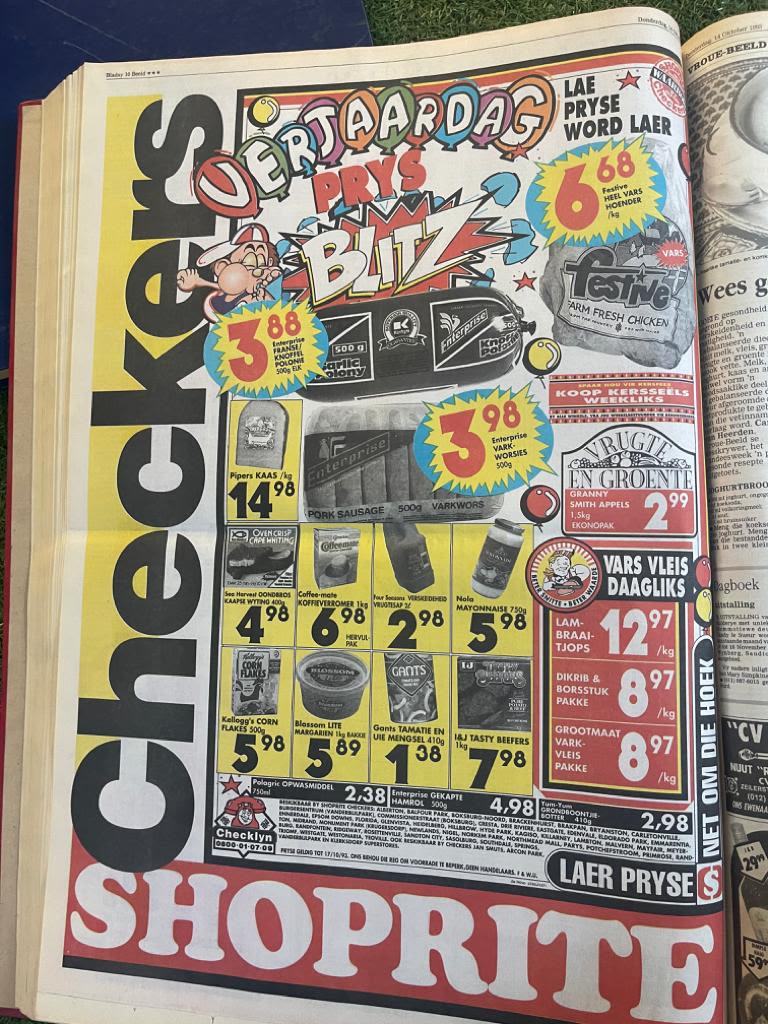Best said in our Taal - Your news guide to influencing Afrikaans shopping habits

In 2025 Afrikaans will celebrate its centenary as one of South Africa’s official indigenous languages. In less than 100 years, this unique language developed from a vernacular, frowned upon as "Kitchen Dutch", into a medium fully functional in formal fields, ranging from literature, academia, business, education, medicine and, yes, marketing and advertising.
With its roots deep and influences from all over the globe, the history of the language is as interesting as its speakers. Emanating from a mixture of Dutch, English, French, Malay and Portuguese, and coming to life in the mouths of enormously diverse people, Afrikaans is a hotchpotch, rich in texture, idioms and metaphors. The Arabic alphabet was used to write the language for the very first time in the Cape.
Like any other language in the world, its history is diverse and certainly not without controversy, as is the story of its users. Afrikaans people are aware that their language serves as an example of what can be achieved when an indigenous language has access to resources for development.
Now, research conducted by Media24 into the Afrikaans market shows that these readers are proudly South African, loyal to local products, and they have expendable income.
Speaking to the Heart
Long before the Bible was first translated into Afrikaans, printed newspapers played a fundamental role in shaping the identity and culture of Afrikaans speakers. DIE PATRIOT, published in 1876, was the first of many news publications that offered a voice to this community.
Today, the picture looks slightly different, with papers and magazines still being published in print, but high quality journalism now also dominating electronically and online - to great success. Netwerk24 attracts 1.7 million online readers and is the leading subscription-based news site in South Africa with more than 90 000 monthly digital subscribers.
"For this audience, hearing or seeing an advertising message in Afrikaans goes straight the core; no emotional or intellectual 'decoding' necessary. Afrikaans is the language in which they think and dream. Advertising in their mother-tongue also shows respect for who they are and acknowledges their importance in the marketplace. This is true for all indigenous languages in our country. Afrikaans-speaking people is an important market segment, with a lot of buying-power and advertisers should maximise their chances of reaching them."
Afrikaans readers embrace modern technology and use mobile apps, social media and the internet every single day, with 76% of them having access to wifi.
When it comes to print, publications like Rapport, Die Burger, Beeld, Volksblad, Son and Huisgenoot serve them with information nationwide, while regional newspapers like Distrikspos, Standard, Paarl Post, Eikestadnuus and Hermanus Times reach doorsteps in remote corners.
All these titles have a home in the Media24 stable, reaching 71% of the total Afrikaans market. This equates to 1.6 million dedicated print readers with an average monthly income of up to R22 375, and 2 million online readers with an average monthly income of R23 041. Members of this audience share one notable habit – because they are passionate about news and current affairs, they consult newspapers and online news sites to inform their shopping decisions.
"If you talk to a man in a language he understands, that goes to his head. If you talk to him in his own language, that goes to his heart,” the late Nelson Mandela said. This is spot on as far as Die Burger's readers are concerned, for whom Afrikaans is not just a language, but an entire worldview. In South Africa, as a multilingual country, it is inevitable that communication happens more and more in English as a bridging language. Our readers also use English like that, but then experience Die Burger as a place of the heart and reading it is more than just catching up on news or entertainment – it is a homecoming."
This audience places a high premium on receiving news in their own language, and they are prepared to pay for it. Beeld, Son and Die Burger are the most-read daily papers and Rapport, Beeld Saterdag and Die Burger Saterdag have the highest reach of weekly papers. One in five people read a paid-for newspaper every day – a tendency double that of the overall market.
Being well-educated with almost 100% who have matric and more than 50% with tertiary qualifications, they prefer their news in text format. And when they read, they pay attention, spending 100 minutes on average with newspapers each week.
Afrikaans readers are early birds who love to catch their news in the mornings, and especially on Sundays, the first day of the week. You are guaranteed to find more than 1.2 million readers opening Rapport every Sunday.
Most readers prefer content about current affairs, local news, the environment and tech news. And if you want a smile on their faces, you must surprise them with leaflets in newspapers and magazines; 66% study it meticulously for discounts and special offers when deciding what to shop where. And they don’t shy away from registering to receive a weekly digital catalogue with updates.
News readers are more frequent shoppers than the population at large, and they regard advertisements as a source of reliable information when buying food and groceries, furniture and home appliances. Virtually all readers are household decision-makers for shopping for groceries and large household items.
Media24 knows how to reach this market segment with advertisements at key points of the month. Social media, music and reading books are the main pastimes of this audience, and the company caters to these interests. This market is motivated in getting ahead in their careers, and they are adventurous about trying new things. And they communicate in a language that is playful, poetic and important to them.
Furthermore, advertisements in Afrikaans have won many awards over many decades, famous for unforgettable expressions that became part and parcel of the idiomatic treasure of everyday speakers.
International airlines like Emirates and Qatar Airways know how to retain the loyalty of South African passengers by welcoming them on board in many of our indigenous languages. So should you! Media24 publications offer you a precious gateway to this informed and influential market.
"If you address someone in their own language, you speak to their heart.


